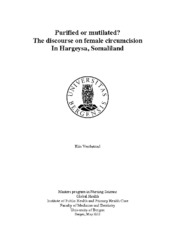Purified or mutilated? The discourse on female circumcision in Hargeysa, Somaliland
Master thesis
Permanent lenke
https://hdl.handle.net/1956/6170Utgivelsesdato
2012-05-15Metadata
Vis full innførselSamlinger
Sammendrag
Background: Female circumcision is a practice which has existed for thousands of years and is carried out across Africa from the north eastern coast to the west coast. On the Horn of Africa nearly all Somali women are circumcised, most of which are infibulated. Aim: The aim of the study has been to reveal current views, public and political opinions and to explore how and by whom the discourse on female circumcision was expressed at the time of the study, in Hargeysa, Somaliland. Method: Numeral informal conversations were held with health workers and students in a hospital. In depth interviews with 3 women involved in the work to abandon female circumcision, and interviews drawing on principles of life story interviews were held with 5 returned exile women. Field notes were continuously written throughout the time spend in Hargeysa. The discourse that emerged from the material was analyzed using the principles of Foucault. Results: Analysis of the discourse on female circumcision revealed a discourse of a changing practice despite indications of a continuation of the practice, although in a changed form. Whether this change applies to the actual practice lies beyond the premises of the study. Conclusion: Abandoners' of female circumcision rely on political, ideological and economic support from outside, including the Somali diaspora for the eradication effort. Health workers supported by health research and the community of religious leaders reveal reasons for abandonment of infibulation, while the same reasons do not strongly enough emphasize the necessity to end sunna circumcision. Practitioners' of female circumcision still perceive circumcision of girls as necessary to become good' and pure' women. Confusing, contrasting and religiously connected terms for the practice may partly be the reason for a delayed process to end an unfortunate human practice.
